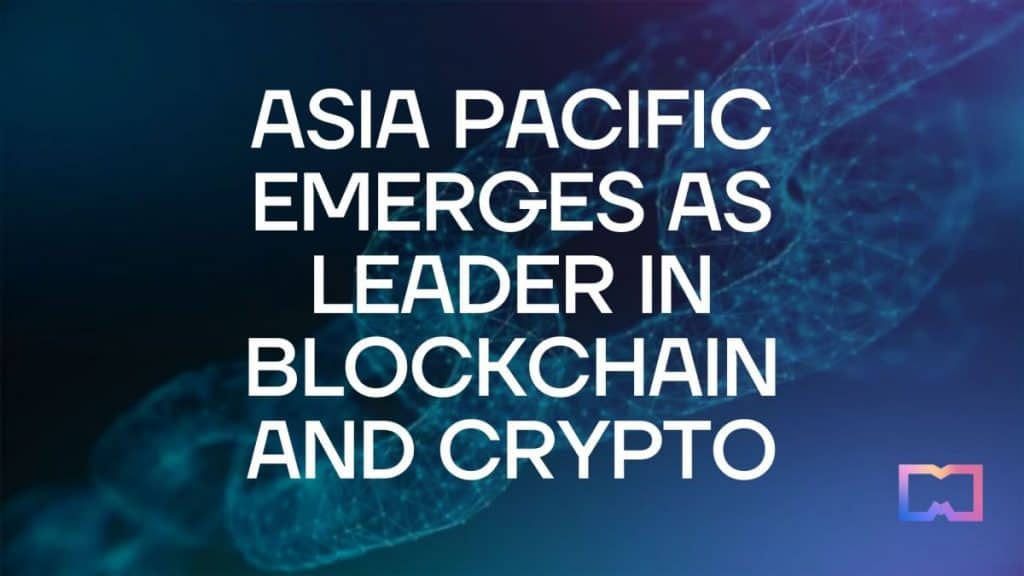Asia Pacific Leads the Charge in Blockchain and Cryptocurrency Evolution


In Brief
The Asia Pacific region is rapidly advancing as a global epicenter for blockchain and cryptocurrency, reshaping its financial and regulatory landscapes in the process.
This leadership is characterized by innovative applications, financial inclusivity efforts, and proactive regulatory approaches.

Blockchain and cryptocurrencies are shaping the world’s economic future. At the heart of this revolution lies the Asia Pacific region, swiftly embracing these technologies and reshaping its financial and regulatory landscapes.
But why and how has Asia Pacific taken on such a pivotal role? How does its trajectory contrast with the global landscape? Let’s explore these intricacies…
Blockchain, commonly linked with cryptocurrencies, fundamentally emphasizes decentralization, transparency, and heightened security. The Asia Pacific region, marked by its dynamic economies and diverse financial access, notably seems to be drawn to the following attributes:
- Cross-Border Transactions: The diverse region benefits significantly from blockchain’s ability to simplify and expedite cross-border trades.
- Financial Inclusivity: In nations like the Philippines and Indonesia, traditional banking systems often exclude a substantial portion of the population. Blockchain offers a secure and affordable alternative, empowering previously marginalized communities.
- Supply Chain & Logistics: As the world’s manufacturing powerhouse, efficient supply chain management is paramount for Asia Pacific. Blockchain provides transparency and traceability, essential elements for today’s globalized supply chains.
Is Cryptocurrency The New Financial Frontier?
While Bitcoin and Ethereum have become global household names, their impact in the Asia Pacific is noteworthy.
Cryptocurrencies, driven by volatility in conventional markets and influenced by distinct economic pressures in nations such as China and South Korea, have positioned themselves as speculative assets and instruments for safeguarding wealth.
Furthermore, cryptocurrencies extend beyond the realm of investment. In the context of the region’s substantial expatriate workforce, they have served as a cost-effective and streamlined alternative for remittances, enhancing the efficiency of money transfers.
Countries like Japan and Singapore currently lead in crafting holistic regulatory frameworks that prioritize both growth and security. In contrast to the reactive stances seen in regions like Europe and North America, Asia Pacific’s regulatory agility stands out, reflecting a proactive approach.
Countries across the Asia-Pacific region are providing clear regulatory guidance for the crypto industry.
— Ripple (@Ripple) April 7, 2023
Hear from APAC Ripple Policy Director @radvanisg on who is making strides to support crypto innovation.#CryptoInOneMinute ⏱️ pic.twitter.com/5DZeOGQZcW
The Rise of Central Banks and Digital Currencies
It’s not just startups and tech giants playing in the blockchain field. Central banks, recognizing the disruptive potential, are also keenly exploring digital currencies.
China’s digital yuan is a prominent example, and it is currently positioning the nation at the forefront of government-backed digital currency initiatives. However, western counterparts such as the US Federal Reserve or the European Central Bank have not yet mirrored this proactive exploration on a comparable scale.
Major tech firms like Alibaba and Tencent are propelling the blockchain surge in the Asia Pacific. Their significant investments in blockchain R&D are said to have set an innovative pace in the region. The dynamic startup ecosystem teeming with inventive solutions is further solidifying the region’s influential global standing.
Blockchain’s Universal Appeal with Regional Nuances
While blockchain’s decentralized and secure nature resonates globally, its application varies depending on regional challenges and demands.
- Asia Pacific’s Unique Proposition: With a diverse economic landscape, blockchain in Asia Pacific primarily addresses challenges like improving cross-border transactions, ensuring financial inclusivity in unbanked regions, and optimizing supply chains.
- Western Approaches: In the West, especially in North America and Europe, blockchain has been predominantly viewed through the lens of cryptocurrency investments and enterprise-level solutions, focusing on sectors like healthcare, real estate, and finance. The drive towards financial inclusivity is less pronounced than in the Asia Pacific.
Cryptocurrencies have gripped the world, but their reception and application diverge.
In the Asia Pacific region, cryptocurrencies serve as both alternative investments and functional tools. Notably, China and South Korea stand out for their adoption of digital currencies as investment assets and mediums for preserving wealth.
Likewise, in North America and Europe, while Bitcoin and its counterparts have gained traction as alternative investments, regulatory skepticism has somewhat curtailed its expansive use as a functional currency.
Blockchain’s disruptive potential necessitates regulatory measures. However, the regulatory ethos varies significantly.
Countries like Japan and Singapore are proactively molding regulations that balance innovation and security. Their agile frameworks, designed with future growth in mind, distinguish them.
On the other hand, in Western countries, there’s an acknowledgment of blockchain’s potential, but a cautious approach is taken. The US and European nations assume a more thoughtful stance, with regulatory frameworks still in flux and sometimes trailing technological progress.
Asia Pacific and the Global Digital Symphony
Asia Pacific’s emergence as a leader in blockchain and cryptocurrency adoption is not coincidental; it’s a confluence of regional needs, economic dynamism, and proactive regulation.
Although challenges lie ahead, the region’s dedication to adopting digital finance highlights its role as the hub of global financial innovation. In contrast to the more cautious approach taken in other parts of the world, Asia Pacific’s decisive advancements are demonstrating its resolve to shape the future of finance.
Read more:
- Nvidia Introduces Revolutionary Neuralangelo Model for Stunning 3D Video Transformations
- PayPal’s Bold Move into the DeFi Ecosystem
- SEC and the Bitcoin ETF Conundrum: Delays, Politics, and the Future of Crypto Regulation
Disclaimer
In line with the Trust Project guidelines, please note that the information provided on this page is not intended to be and should not be interpreted as legal, tax, investment, financial, or any other form of advice. It is important to only invest what you can afford to lose and to seek independent financial advice if you have any doubts. For further information, we suggest referring to the terms and conditions as well as the help and support pages provided by the issuer or advertiser. MetaversePost is committed to accurate, unbiased reporting, but market conditions are subject to change without notice.
About The Author
Nik is an accomplished analyst and writer at Metaverse Post, specializing in delivering cutting-edge insights into the fast-paced world of technology, with a particular emphasis on AI/ML, XR, VR, on-chain analytics, and blockchain development. His articles engage and inform a diverse audience, helping them stay ahead of the technological curve. Possessing a Master's degree in Economics and Management, Nik has a solid grasp of the nuances of the business world and its intersection with emergent technologies.
More articles

Nik is an accomplished analyst and writer at Metaverse Post, specializing in delivering cutting-edge insights into the fast-paced world of technology, with a particular emphasis on AI/ML, XR, VR, on-chain analytics, and blockchain development. His articles engage and inform a diverse audience, helping them stay ahead of the technological curve. Possessing a Master's degree in Economics and Management, Nik has a solid grasp of the nuances of the business world and its intersection with emergent technologies.



















































